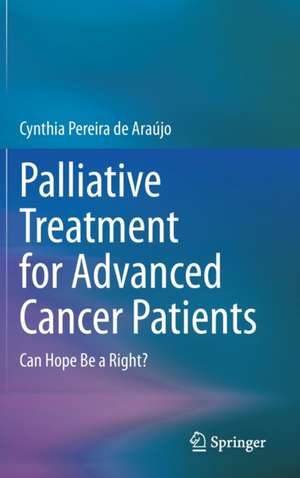Palliative Treatment for Advanced Cancer Patients: Can Hope Be a Right?
Autor Cynthia Pereira de Araújoen Limba Engleză Hardback – 6 mai 2023
In addition to this theoretical discussion, the book also presents the results of a qualitative research the author conducted with 48 advancedcancer patients in Brazil and Germany to investigate their expectations towards chemotherapy. This study has confirmed that many patients decide to undergo often toxic and exhausting treatments, unrealistically believing that their cancer is curable or that, as long as they continue with a course of chemotherapy, cancer may be beaten.
Palliative Treatment for Advanced Cancer Patients: Can Hope Be a Right? will be of interest to health professionals and social workers working with advanced cancer patients, as well as to researchers in the fields of public health, bioethics, medical ethics and health law, especially those interested in the growing interdisciplinary field of end-of-life decision-making.
| Toate formatele și edițiile | Preț | Express |
|---|---|---|
| Paperback (1) | 896.40 lei 3-5 săpt. | |
| Springer Nature Switzerland – 7 mai 2024 | 896.40 lei 3-5 săpt. | |
| Hardback (1) | 902.80 lei 6-8 săpt. | |
| Springer Nature Switzerland – 6 mai 2023 | 902.80 lei 6-8 săpt. |
Preț: 902.80 lei
Preț vechi: 950.31 lei
-5% Nou
Puncte Express: 1354
Preț estimativ în valută:
172.75€ • 178.22$ • 144.16£
172.75€ • 178.22$ • 144.16£
Carte tipărită la comandă
Livrare economică 26 martie-09 aprilie
Preluare comenzi: 021 569.72.76
Specificații
ISBN-13: 9783031307751
ISBN-10: 3031307755
Pagini: 114
Ilustrații: XV, 114 p.
Dimensiuni: 155 x 235 mm
Greutate: 0.36 kg
Ediția:2023
Editura: Springer Nature Switzerland
Colecția Springer
Locul publicării:Cham, Switzerland
ISBN-10: 3031307755
Pagini: 114
Ilustrații: XV, 114 p.
Dimensiuni: 155 x 235 mm
Greutate: 0.36 kg
Ediția:2023
Editura: Springer Nature Switzerland
Colecția Springer
Locul publicării:Cham, Switzerland
Cuprins
Chapter 1. Introduction.- Chapter 2. What is a Right to Health?.- Chapter 3. A Right to Health or a Right to Hope?.- Chapter 4. Dignity and Autonomy: No Place for Illusion.- Chapter 5. Difficult Conversations.- Chapter 6. Palliative Care: Life with Dignity - Until its End.- Chapter 7. It’s Time to Talk About Dying.
Notă biografică
Cynthia Pereira de Araújo has been a state attorney at the Federal Attorney General’s Office in Brazil since 2009 and has a solid research background in health legislation and Bioethics, and a teaching portfolio in multiple areas. She holds a Master’s degree and a PhD in Law from the Catholic University of Minas Gerais, Brazil (PUC-Minas), with a Doctoral Stay at Vechta University – Germany (CAPES/DAAD), receiving a Scholarship from the Brazil-Germany Bilateral Cooperation Program – PROBRAL. She is algo a regular columnist on Bioethics issues for the Brazilian Newspaper Folha de São Paulo (Morte sem Tabu Blog).
Textul de pe ultima copertă
This book presents an important reflection on the concept and limits of the Fundamental Right to Health as opposed to a supposed "Right to Hope" in the context of the treatment of patients with advanced cancer. The central idea of the work is the question of whether and to what extent patients with advanced cancer have the right to legally demand a palliative treatment whose efficacy has not been proven from the point of view of the desired objectives. The book demonstrates how hope cannot be subject to legal protection and, also, that, even if theoretical-legal reasons were not sufficient for the absence of an abstract right to hope, ethical reasons would be. The work concludes that the best palliative care, rather than palliative treatment, guarantees the best right to health for advanced cancer patients, especially in terminal cases.
In addition to this theoretical discussion, the book also presents the results of a qualitative research the author conducted with 48 advanced cancer patients in Brazil and Germany to investigate their expectations towards chemotherapy. This study has confirmed that many patients decide to undergo often toxic and exhausting treatments, unrealistically believing that their cancer is curable or that, as long as they continue with a course of chemotherapy, cancer may be beaten.
Palliative Treatment for Advanced Cancer Patients: Can Hope Be a Right? will be of interest to health professionals and social workers working with advanced cancer patients, as well as to researchers in the fields of public health, bioethics, medical ethics and health law, especially those interested in the growing interdisciplinary field of end-of-life decision-making.
In addition to this theoretical discussion, the book also presents the results of a qualitative research the author conducted with 48 advanced cancer patients in Brazil and Germany to investigate their expectations towards chemotherapy. This study has confirmed that many patients decide to undergo often toxic and exhausting treatments, unrealistically believing that their cancer is curable or that, as long as they continue with a course of chemotherapy, cancer may be beaten.
Palliative Treatment for Advanced Cancer Patients: Can Hope Be a Right? will be of interest to health professionals and social workers working with advanced cancer patients, as well as to researchers in the fields of public health, bioethics, medical ethics and health law, especially those interested in the growing interdisciplinary field of end-of-life decision-making.
Caracteristici
Discusses the limits of palliative treatment for advanced cancer patients and its legal and ethical implications Argues that futile medical care is based on a supposed right to hope, which cannot be subject to legal protection Shows the importance of palliative care as the best way of guaranteeing advanced cancer patients’ right to health
